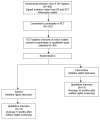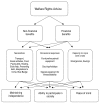The acceptability and impact of a randomised controlled trial of welfare rights advice accessed via primary health care: qualitative study
- PMID: 16790054
- PMCID: PMC1513564
- DOI: 10.1186/1471-2458-6-163
The acceptability and impact of a randomised controlled trial of welfare rights advice accessed via primary health care: qualitative study
Abstract
Background: Qualitative research is increasingly used alongside randomised controlled trials (RCTs) to study a range of factors including participants' experiences of a trial. The need for a sound evidence base within public health will increase the need for RCTs of non-clinical interventions. Welfare rights advice has been proposed as an intervention with potential to reduce health inequalities. This qualitative study, nested within an RCT of the impact of welfare rights advice, examined the acceptability of the intervention, the acceptability of the research process and the perceived impact of the intervention.
Methods: 25 men and women aged 60 years or over were recruited from four general practices in Newcastle upon Tyne (UK), a sub-sample of those who consented to be contacted (n = 96) during the RCT baseline interview. Semi-structured interviews were undertaken and analysed using the Framework Method.
Results: Participants viewed the trial positively although, despite agreeing that the information leaflet was clear, some had agreed to participate without being fully aware of what was involved. Some participants were unaware of the implications of randomisation. Most thought it fair, but a few concerns were raised about the control condition. The intervention was acceptable and made participants feel confident about applying for benefit entitlements. 14 out of 25 participants received some financial award; median weekly income gain was pounds 57 (Euro 84, dollar 101). The perceived impact of additional finances was considerable and included: increased affordability of necessities and occasional expenses; increased capacity to deal with emergencies; and a reduction in stress related to financial worries. Overall, perceived independence and ability to participate in society increased. Most participants perceived benefits to their mental well-being, but no-one reported an improvement in physical health. The RCT showed little or no effect on a wide range of outcome measures.
Conclusion: Participation in the trial and the intervention was acceptable to participants. Welfare rights advice targeted at people aged 60 years or over and accessed via primary care had a positive impact on quality of life and resulted in increased social participation. The divergence of qualitative and quantitative findings suggests that both methods make important contributions to the evaluation of complex social interventions.
Figures
References
Publication types
MeSH terms
LinkOut - more resources
Full Text Sources



